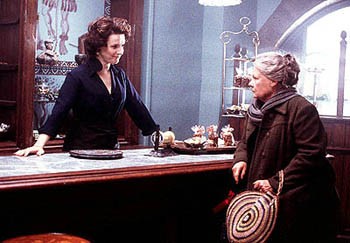Chocolat.
Sweet Jesus
Comic Reed Martin on God, vinegar, and ‘Chocolat’
Writer David Templeton takes interesting people to interesting movies in his ongoing quest for the ultimate post-film conversation. This is not a review; rather, it’s a freewheeling, tangential discussion of art, alternative ideas, and popular culture.
“IT’S WEIRD that I’m not hungrier than I am,” notes a wide-eyed Reed Martin, working his way through the bustling lobby of the Sequoia Theater in downtown Mill Valley. We’ve just seen Lasse Halström’s Chocolat, a charming little fantasy about a sexy sweet-maker who stirs up appetites in a deeply religious village in 1959 France. Now we’re headed outside into the face-slapping cold of the night.
By happy coincidence, it is the feast of St. Macarius, the patron saint of chefs. Presumably these chefs include chocolate makers, whose sweet craft was on prominent display in the film.
“All those close-ups of dripping chocolate, of mugs of hot chocolate, of those ‘Nipples of Venus,’ ” marvels Martin, the amiable actor-author-comedian-circus clown best known for his years of inspired literary lunacy with the infamous Reduced Shakespeare Company. “You’d think it would have made me want some chocolate.”
What Martin does want on this icy evening is a nice hot cup of coffee. And maybe some soup. Perhaps a warm fire to sit beside. It takes us 10 minutes to find all three inside a cheery cafe just down the street from the theater.
The Reduced Shakespeare Company is known for its irreverently condensed staged versions of great works of art and literature. The troupe first made its name with The Compleat Works of Wllm Shkspr. Then, with longtime members Adam Long and Austin Tichenor, it went on to shrink the history of the United States and the Bible.
Last year, while Long maintained a London-based RSC troupe in the West End–where The Compleat Works has now become the longest-running show in West End history–Martin and Tichenor toured The Compleat Millennium Musical–1000 Years in 100 Minutes.
They also collaborated on a new book, The Greatest Story Ever Sold: A Considered and Whimsical Illumination of the Really Good Parts of Holy Writ. In the typically farcical book, Martin and Tichenor trade chapters, describing and arguing over their favorite Bible stories, until Tichenor develops leprosy and dies, only to rise from the dead and start a brand-new religion–an act that, frankly put, pisses Martin off. Sounds like fun.
Most recently, Martin, Tichenor, and Long reunited in Vancouver to tape the legendary Shakespeare Show before a live audience, the results of which are scheduled to air on PBS this March. Martin–a former circus clown–has only just returned to his home in Sonoma, where he routinely recuperates with his wife, Jane, and their two children. He’s a busy, and understandably exhausted, man.
To tell the truth, why Martin ever agreed to leave home and head out to the movies tonight is rather beyond me. And yet, here we are.
“I enjoyed the movie. It was sweet,” he says. “No pun intended.”
Especially appealing to Martin was the conflict between Vianne, the chocolate maker (played by Juliette Binoche) and the town’s pious mayor, the Comte de Reynaud (Alfred Molina). When the film starts, it is Lent, a season of sacrifice and self-denial. That anyone would open a candy shop at such a time–right across from the church, in fact–provokes de Reynaud into increasingly desperate fits of comic frustration. It doesn’t help that the villagers, gradually tempted to try Vianne’s creations, find themselves becoming strangely desirous of, well, all physical pleasures.
“You know, chocolate and religion can work nicely together,” Martin points out. “Look at Advent calendars.
“I think it’s the church’s job to be intolerant,” he suggests. “That’s the service they provide, to be the vinegar to life’s honey. It’s a tough job, but someone’s got to do it, or we wouldn’t all appreciate the honey.”
My guest has met his share of Religious Vinegaristas.
“There was this religious zealot in England,” he recalls. “His name was Tony Bennett. Not that Tony Bennett. He got a bee in his bonnet and started calling the Bible show names. He said it was Godless.” Godless? What the hell was that guy talking about? God must be mentioned in the show at least a hundred times!
“Well,” Martin continues, “it turns out there are blasphemy laws in England and Ireland. So he took the show to court. There were organized protests, with protesters and everything, sometimes several dozen of them, out in front of the theater waving signs.
“Then word started spreading that, in the show, I come out and play Jesus dressed as a Teletubby. I do come out as the Easter bunny and talk about Jesus, but I never do Jesus as a Teletubby. I kind of wish we’d thought of that, though.”
The court case was eventually dismissed when local lawmakers attended the show and proclaimed it “rather juvenile”–but not blasphemous. It should not be said that Martin, who confesses to regularly attending Mass, feels that morals are always bad things.
“I think people like rules,” he says. “The gray areas are uncomfortable. But sometimes people become too addicted to rules and start ruling things out that are genuinely wonderful and good, things that God might actually enjoy.”
Like the Reduced Shakespeare Company?
“Sure. I think God would get a real kick out of the Bible show.”
And chocolate?
“Definitely,” Martin says. “I’m pretty sure Jesus would have loved chocolate.”
One thing’s for sure. If Jesus really didn’t approve of such treats, old St. Macarius would be out of a job.
From the January 25-31, 2001 issue of the Northern California Bohemian.








